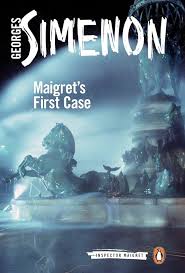Maigret’s First Case (1948) by Georges Simenon.
Good Reads meta-data is 192 pages, rated 3.69 by 1664 litizens.
Genre: Krimi.
DNA: France; sub-species Simenon.
Tagline: In the beginning….
Verdict: Introspective.

A callow Jules Maigret and his blushing bride Louise have taken an apartment with his income as a police secretary at an arrondissement station. The job is largely clerical but one night when he is working late in his youthful zeal and the duty officer is out on a call he records the statement of a witness who reports a gunshot. Since it is what police officers do, Maigret takes it upon himself to investigate without waiting for a superior officer.
In so doing he enters a closed world of a very rich but strange bourgeois family in whose mansion the shot seemed to have been fired. Yet there is no evidence of such an occurrence when he rouses the household at 2 am to find out. Ooops!
Evidence or no, there is something odd about this place and these people and he worries away at it. When he reports all of this to his chief it seems absurd, but the chief with more than a touch of condescension encourages him to investigate, but softly, softly, perhaps to give him practice. Maigret does so with the patience and persistence that would mark all of his investigations.
When circumstances forced young Maigret (and it hard to picture a young and gangly Maigret) to leave medical school, the first job he could land to make money was with the police where his education and good handwriting fitted him to be a records officer. In this story he is posted to the fictitious Saint Georges station as secretary to the chief of this outpost, far from the Quai des Orfeves. Musing on the events that placed him there Maigret thinks the occupation he should have is part doctor and part priest:
‘People would have come to see him the way they consulted a doctor. He would have been a sort of mender of destinies.’ Not because he was clever but because could put himself into anyone’s shoes. Balzac
This is Maigret’s motif: to become one with those he investigates. This melding is beautifully realised in some of the novels.
The solemnity of that reflection was relieved when I laughed aloud at the following passage:
‘He hadn’t slept with his moustache net on and he had to straighten the tips…’
Moustache net! Great Movember’s Ghost! My efforts to find such a net for sale online have failed. Must chaps now do without such a useful accessory? See an example in use below.

This book is good evidence for not reading a series in publication order. While this is case Number One in Maigret’s career it is book number thirty (30) in the publication sequence.
There are occasional references to the future so the retrospective nature of the account is implicit, but this story is played out in a linear sequence.
Having finished a period krimi with steaming heaps of superfluous historical detail and a mob of characters, I wanted something clean and focussed. Enter Maigret.

